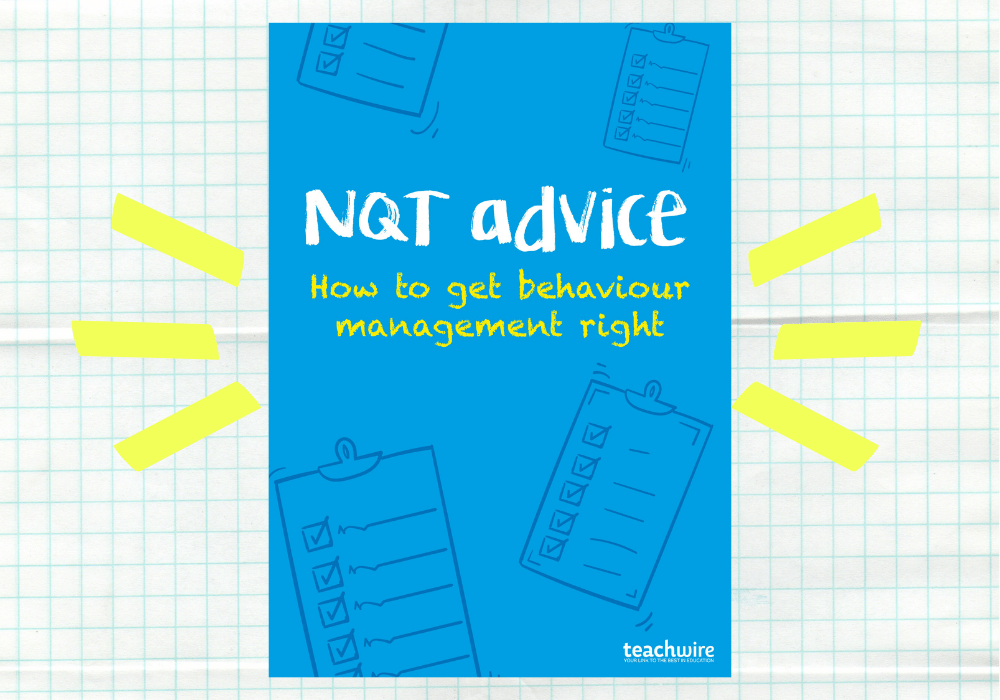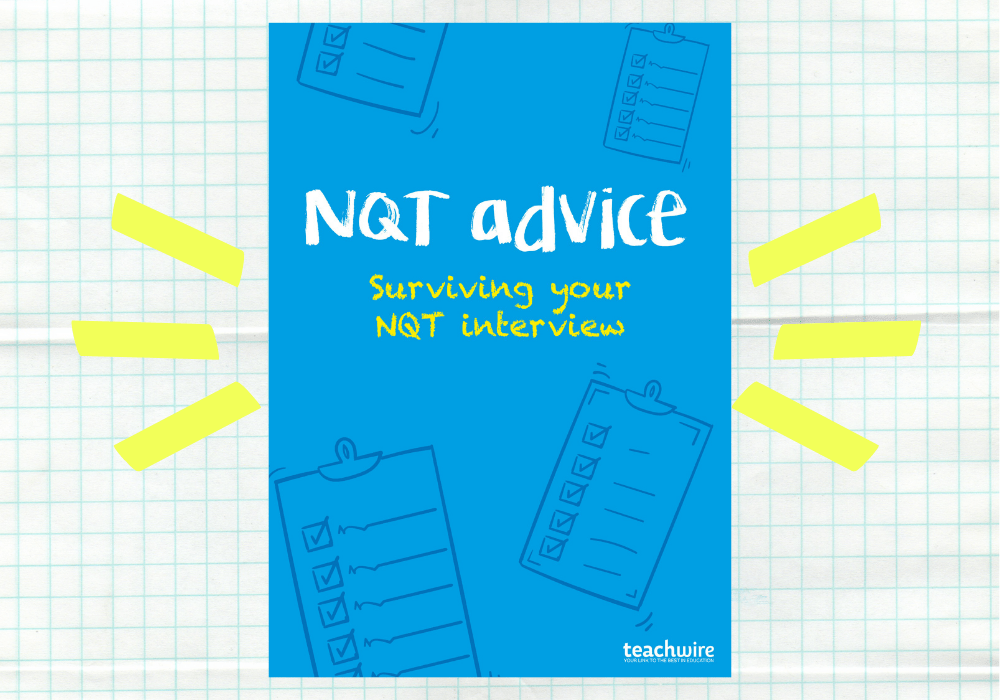NQT year – How to survive as an NQT

Learning how to teach is daunting enough, but what should you do when a pandemic is added into the mix? Hear from experts and fellow trainees about how they plan to tackle the start of the school year…

- by Teachwire
- Classroom expertise and free resources for teachers


Emma Meadus, headteacher at Coppice Valley Primary in Harrogate, North Yorkshire, has two essential pieces of advice for NQTs this year: ask for help, and don’t try and reinvent the wheel...
What should be a priority for brand-new NQTs this September? Emma says: “As soon as you can, ask your mentor for the school’s curriculum, teaching and learning policy, staff handbook and any relevant subject and behaviour policies. These should provide the backbone for your planning.”
“If you’re working in a large school and have colleagues who are teaching the same year group or classes, ask them to share their planning with you. There’s plenty of time to add your own flair to lessons in the months and years to come, but you don’t need to start from scratch.”
Keeping it simple is vital, says Emma. “When planning, avoid gimmicks and overly complicated tasks that take hours of preparation. You’ll be much better off putting your time into thinking through the steps in your teaching process, questioning and feedback techniques and how you’re deploying any TAs.”
“Avoid gimmicks and overly complicated tasks that take hours of preparation”
You may have started your new role feeling bright-eyed and bushy tailed, but what should you do if you feel unsupported by your mentor or other colleagues?
“If you are not getting the support you need, then don’t just try to muddle on,” says Emma. “It won’t work.”
“Talk to the colleagues you’ve struck up a relationship with and explore why the support isn’t there for you. Perhaps staff are overworked or stressed?”
“There’s plenty of time to add your own flair to lessons in the months and years to come”
“Usually, colleagues do want to support new teachers but they’re busy people and it really does ‘take a village’. Try to broaden your sights, looking for support across the school and, of course, local ECT networks in your LA or academy trust. Online support communities, like eduTwitter, are fantastic – the hashtags #NQT and #ECT (early career teacher) are a good place to start.”
There’s no doubt that NQTs will be in a different place mentally this year, compared to previous cohorts, due to the Covid disruption they’ve put up with during their training.
With less time in the classroom during training, Emma foresees that NQTS may feel that they haven’t yet developed some of the more complex teaching skills. “Planning for pupils with SEND, EAL and SEMH needs can all be tricky areas,” says Emma. “Schools need to provide extra support to NQTS in the autumn term to ensure they’re meeting these pupils’ needs.”
At Emma’s school they are planning additional induction sessions with the SENCo for NQTs, as well as whole-staff refresher training on SEND, EAL and behaviour strategies.
Emma’s behaviour advice for NQTs
Invest plenty of time in the first weeks into training your pupils in your class routines. Devising simple routines will help to keep transitions – which are often when behaviour incidents happen – running smoothly.
Think through all the parts of your day, and even the separate components within your lessons.
At Coppice Valley we have whole-school routines for lining up, how to ask for help, getting the class’s attention and giving out and collecting books. It makes a huge difference!
Funding the ‘lost cohort’

PGCE senior lecturer and ECF-NPQ facilitator Haili Hughes explains new one-off payments on offer for schools with NQTs, and how she thinks schools should use the money…
Teaching during a global pandemic has been challenging for experienced teachers – let alone those new to the profession.
Many involved in ITT and NQT support fear that the new generation of teachers has become a ‘lost cohort’ due to the lack of time spent in schools and needing to adapt to rapidly changing pedagogies.
So, it seems only right that the DfE has recognised this and pledged that all state-funded schools that currently have an NQT, who is due to complete induction this summer, will have access to a ‘one-off payment to further support the development of this cohort’.
This one-off payment will match the equivalent of an additional 5% off timetable for the academic year 2021/22, which equates to 44 hours, so early career teachers will have additional time to invest in their development.
However, the extra time off timetable is not statutory and school leaders will be able to use the funding in the best way for their schools – including being used for half or whole days off.
The payments have been calculated by taking the average minimum NQT salary declared in the school workforce census returns and then splitting them by region, so that schools in inner London will receive £1,500, and in the rest of England, schools will receive £1,200.
The funding will be made in arrears and included as part of the normal payments the schools get from the Education and Skills Funding Agency.
Although school leaders are being trusted to use the money in the best ways for their school staff, schools will be asked by the DfE to confirm that the money has been deployed in the way intended and there will be clear communication from the DfE about the terms and conditions of schools accepting the money.
In addition, schools will need to keep records of the expenditure, like a receipt for classroom cover, or a timetable for the NQT involved and these may be spot-checked by the DfE.
“School leaders will be able to use the funding in the best way for their schools”
With the challenges this year has brought, the extra payment can surely only be a welcomed from school leaders; it brings parity with early career teachers, who will be eligible for a reduced timetable in year one and two as part of the Early Career Framework roll out.
NQTs will also have access to the accredited materials from the ECF as part of this support.
Research by BERA this year on how newly qualified teachers have coped during the pandemic explored the effects that less classroom experience has had on NQTs and the results were surprising.
Instead of lamenting lost time, many NQTs spoke about the creative ways they had taught and the unique opportunities they had gained from the experience (la Velle et al, 2020).
The fact does remain though, that many new teachers will be heading into their classrooms this September with much less face-to-face teaching experience than previous cohorts.
“Many new teachers will be heading into their classrooms this September with much less face-to-face teaching experience”
This is why the role of subject mentor and support from the rest of the department will be so vital over the academic year.
For me, the best way to support your recently-qualified teachers with the funding is to give them time to read and discuss research and how to close the gap between the studies and what goes on in the classroom.
Part of these discussions could also include some deliberate practice of the strategies in low-stakes environments – including modelling by more experienced teachers.
As they have spent less time physically in front of the students, new teachers may feel less confident about delivery and this practice and discussion with someone else in the department could make a huge difference to their teaching.
Find Haili Hughes on Twitter at @HughesHaili and visit her website here.
The view from the chalkface

Aishah Bargit is a Teach First ambassador who will be teaching Y5 at Brownlow Fold Primary in Bolton…
Now that I’ve finished my NQT year, I’m nervous but also excited for the year ahead. After receiving fantastic support from my school and my training provider, Teach First, it’ll be strange not having them there to answer my questions.
I’m also moving school, from Birmingham to Bolton, which will be even more of an adjustment, but I’m excited for the new start.
I’m so proud of how my first two years have gone and excited for my teaching skills to continue to strengthen.
Training throughout the pandemic was intense. I got a lot less face time with my pupils, had to adapt to teaching most of my Y4s remotely and have been working to catch them up on their lost learning.
Time has been in short supply and new teachers, especially those serving disadvantaged communities, have worked harder than ever – but it’s pushed us to build our skillsets and made us stronger.
If I could give advice to any new NQTs, it would be to remember that asking for help is not a weakness, you can learn a lot from getting things wrong, and even though it’s a lot easier to say than do – take breaks!

Neil D’Arcy-Jones is a former local newspaper journalist who has recently completed his initial teacher training…
My initial teacher training was far tougher than I ever anticipated. I became aware of other trainees starting to drop out, and was beginning to feel the pressure myself.
I’m not ashamed to admit that I experienced serious doubts, and on a couple of occasions, even thought about joining them by throwing in the towel. I wouldn’t have made it through the training had it not been for my mentors.
At every stage, especially during my second placement, they provided me with sage advice and constant affirmation.
The real surprise for me has been in seeing just how many different elements there are to teaching – whether during a global pandemic or otherwise.
There’s no other feeling quite like the one that comes from seeing the results of your teaching endeavours – be it a beautifully penned essay answer, or an idea that suddenly pops into a student’s head from a follow-up question.
Some of the best moments I experienced in my training year were when we all – students and teachers alike – learnt something new.
I came to realise that my training hadn’t just taught me how to teach and how to be a great teacher; it had also made me a better person in terms of the skills I now possessed, and had given me a better understanding of the kind of person I want to be.
Free download

Prepare to answer NQT interview questions well with our run-down of the most common teacher interview questions, plus some great example responses.
How to feel confident in your career choice, despite Covid

Gloucestershire-based assistant headteacher Nikki Cunningham-Smith on the many ways schools have supported NQTs during a pandemic, and how to research schools when you’re not allowed to visit…
Let’s rewind to a chat I had with a friend in January 2020, discussing new year resolutions.
She was trying to weigh up whether to train to be a teacher or not. I, in all my wisdom said, “2020 mate, nice round even number, something feels good about this year. I say go for it; I mean what’s the worst that could happen?”
I had, of course, just chivvied my friend into teacher training and then doing her NQT year during a pandemic. In my defence, how was I supposed to know what was to come?
While her time navigating life as an ITT and NQT during a pandemic was difficult, it wasn’t impossible, and I believe that’s because of the amazing ways in which schools responded to Covid at every single level. No stone was left unturned by those on the frontline.
The nature of my work meant that I was lucky to work and liaise with various schools, all of which utilised different ways to support and enable NQTs to become a part of their teams.
Despite some of the headlines peddled out over the last year and a half, it’s not all been doom and gloom in education. In fact, this tricky time has proved the commitment of those at the chalkface to bringing in new teachers, despite the constant obstacles thrown at them.
“This tricky time has proved the commitment of those at the chalkface to bringing in new teachers”
Some schools have extended the induction process to provide adequate support opportunities and a realistic timeline for individuals with great potential, allowing them to hone their craft and thrive, even if they’ve contracted coronavirus and had to have a period of absence.
The adjustment to guidance meaning that trainees no longer have to work in two schools hasn’t taken away the need for new teachers to gain experience across different environments. Some settings have set up cross-school NQT networking opportunities, giving new teachers access to activities such as staff training, department meetings and CPD sessions outside of their main placement.
Here’s my advice to early career teachers: when it comes to approaching a school for interview, or even the interview itself, embrace your inner Columbo/Jessica Fletcher/Poirot/Veronica Mars and start researching.
There’s no guarantee that schools won’t continue to use online interviews due to the flexibility they offer and the ability they give to protect bubbles. This means that your access to schools may be limited. So instead, get digging.
A school’s social media presence; past trips; productions; current staff; minutes of governors’ meetings; CPD certificates held; link and feeder schools information; appearances in the local press – these can all give you an indication of the spirit and ethos of the school and help you figure out if this is the school for you.
“Frequent contact opportunities are your right, whether face-to-face or virtually”
And when you do secure that spot, ensure that you are insistent on getting the support you need. Frequent contact opportunities are your right, whether face-to-face or virtually. Your NQT meetings shouldn’t be abandoned, so be proactive in ensuring they happen.
Your mentor can help with plugging any gaps caused by the pandemic, and should be able to signpost you to networking options based around your subject area, behaviour management information and the chance to link up with NQTs in a similar position to you.
Although the landscape has changed, feeling confident about building solid foundations in your new career is very much possible.
Find Nikki Cunningham-Smith on Twitter at @_mrsc_s.
Useful links
- 10 of the best NQT survival guide resources.
- DfE guidance on NQT induction during the coronavirus outbreak.
- NQT survival guide – teacher Sue Drury draws on 20 years of teaching and mentoring experience to run through everything you need to know for your NQT year.










